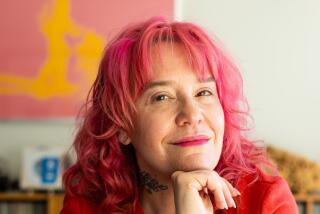Florence Howe, Feminist Press co-founder who championed overlooked women writers, dies
Florence Howe, an activist, educator and major contributor to American literature and culture who as co-founder of the Feminist Press helped revive such acclaimed and influential works as Charlotte Perkins Gilmanâs âThe Yellow Wall-Paperâ and Rebecca Harding Davisâ âLife in the Iron Mills,â has died.
Howe died Saturday in Manhattan, according to the Feminist Press. She was 91 and in recent years had been treated for Parkinsonâs disease.
âFlorence Howe was a visionary with extraordinary literary taste, an ear for transformative ideas, and a steely focus on feminism and social justice,â Linda Villarosa, chair of the Feminist Press board, said in a statement.
A native of New York City and a civil rights activist in the 1960s, Howe and her then-husband Paul Lauter founded the nonprofit publisher in 1970, and dedicated themselves to introducing readers to overlooked and socially conscious works of literature by women, present and past. The Feminist Press would prove an invaluable resource and ally for the emerging Second Wave feminist movement, and for the emerging field of womenâs studies, which Howe also helped promote though chairing a Modern Language Assn. committee on women in education.
âA decade ago, [womenâs studies] had no name. A few academics around the country labeled a segment of their freshman composition courses âgrowing up femaleâ or taught part of a sociology course on âgender,ââ Howe, who had taught at Goucher College among other schools, wrote in a 1976 essay in the New York Times.
One of the Feminist Pressâ most notable releases was âThe Yellow Wall-Paper.â First published in 1892 and narrated by a woman confined by her husband because of âtemporary nervous depression,â Gilmanâs story became the Feminist Pressâ most popular book, selling hundreds of thousands of copies. Another prominent release, âLife in the Iron Mills,â was first published anonymously in 1861 and brought to Howeâs attention by her friend Tillie Olsen.
âI met Tillie in the early 1970s and she handed me a dog-eared copy of âLife in the Iron Mills,â Xeroxed. What happened was she said to me, âRead it, but donât read it at night.â And, of course, I read it at night. I could not go to sleep. First of all, it makes you cry. Secondly, I kept thinking if this was lost forever, there must be more lost forever,â Howe said in 1995.
Other notable Feminist Press releases included Agnes Smedleyâs working-class novel âDaughter of Earth,â Paule Marshallâs debut book âBrown Girl, Brownstones,â and, with financial support from Toni Morrison, a volume of Zora Neale Hurstonâs work that Alice Walker edited. Howe also reissued Olsenâs âSilences,â a landmark study of the books that didnât get written by women and the working class; feminist poetry collections originating everywhere from Vietnam to Italy, and poems, prison letters and other writings by the Russian dissidents Pussy Riot.
Writing in the New York Times in 1985, former National Endowment for the Humanities chair Joseph Duffey called the Feminist Press âan editing and publishing enterprise that has, perhaps more than any other institution, helped to recover and make available a legacy of writing by and about women in American history and scholarship.â
Born Florence Rosenfeld on March 17, 1929, Howe, who took the name of former husband Ed Howe, was long interested in literature and in social justice. She studied English at Hunter College and at Smith College and volunteered to register Black voters in Mississippi during the âFreedom Summerâ of 1964.
More to Read
Start your day right
Sign up for Essential California for the L.A. Times biggest news, features and recommendations in your inbox six days a week.
You may occasionally receive promotional content from the Los Angeles Times.






